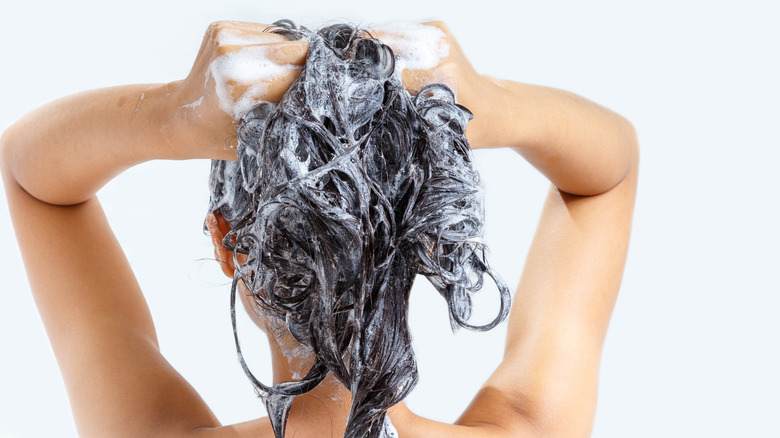The Shampoo And Conditioner Ingredients That Cause The Most Hair Damage
For many of us, taking time to shampoo and condition our hair is a relaxing, mini-spa-type experience. Because of that, we often choose shampoos and conditioners based on their lovely scent, luxurious sudsing ability, or promise to "moisturize" or "defrizz." But maybe we've been looking at it all wrong. It turns out that some of the ingredients commonly found in shampoos and conditioners are actually toxic and can not only damage hair over time, but can even contribute to bigger health problems, too. Let's look at three of the top offenders.
Sulfates (including SLS (sodium lauryl sulfate), SLES (sodium laureth sulfate) and ammonium lauryl sulfate) are all foaming surfactants, which means that they are used to loosen and remove dirt and oils from hair. Unfortunately, they can also do a lot of damage. They strip the natural oils from hair, leaving locks dry, brittle, and prone to breakage. And worse, they can trigger allergic reactions and damage hair follicles to the point where new hair growth can be stifled. That eventually leads to thinning hair (via eMediHealth).
Parabens are added to shampoos and conditioners as preservatives, to extend shelf life and hinder bacterial growth. Unfortunately, they are also quickly absorbed into the body through the skin and can mimic the female hormone estrogen, causing abnormal hormonal fluctuations.
Common shampoo ingredients can actually harm hair
Phthalates are used to increase the 'spreadability,' or flexibility, of cosmetic and household products. In shampoos and conditioners, they are added to make them 'stick' better to hair and scalp. But pthalates come with a risk — they are known to disrupt hormone activity in both males and females, and in doing so increase the risk of several types of cancer, as well as contribute to male infertility, and early onset puberty in girls (via Health). And, they're often covert, hiding in the shampoo label under the word "fragrance."
Disruptions to normal hormonal activity spells trouble for our hair, too. Miami dermatologist Janice Lima-Maribona, MD, explains "Hormone levels can affect the quality and the quantity of hair. The texture of hair is directly related by hormonal issues that relate to thyroid as well as estrogen and testosterone levels" (via New Beauty).
These are just a few of the many ingredients commonly found in shampoos and conditioners that can actually damage hair in the long-run. Thankfully, there are an increasing number of shampoos and conditioners on the market which are made without them.

